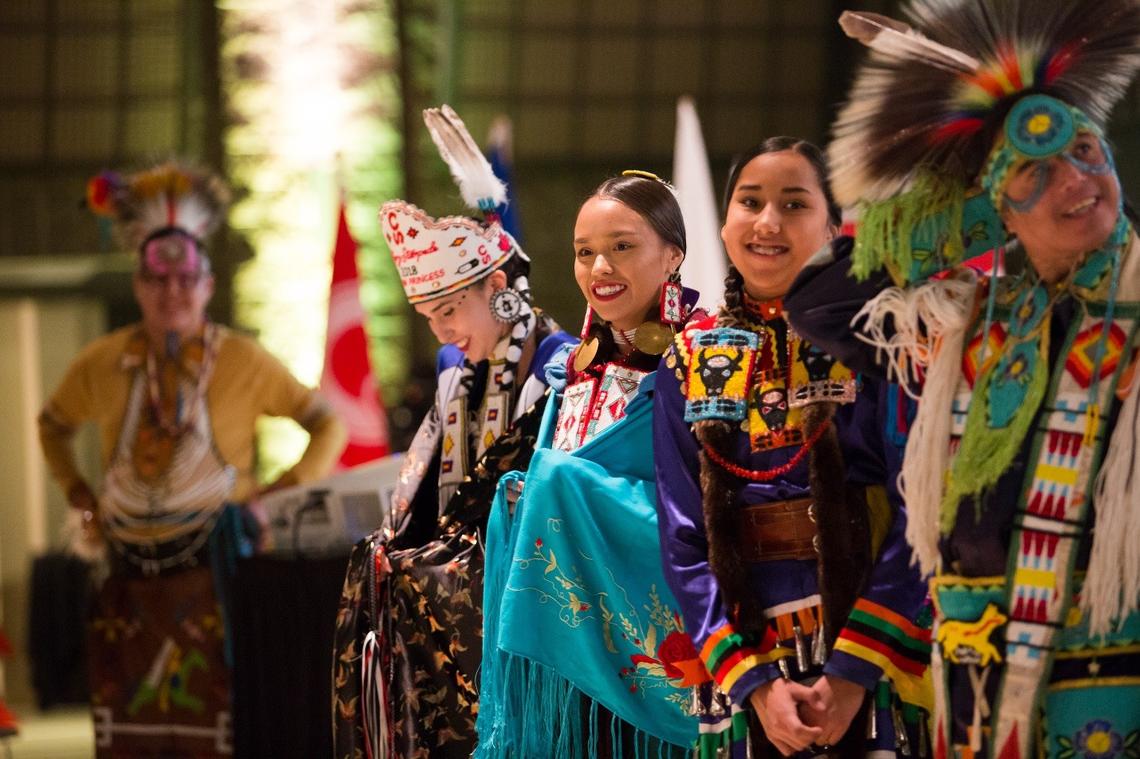Nov. 20, 2017
Decoding decolonization and other big concepts

Dancers at the University of Calgary’s Indigenous Strategy launch event on Nov. 16.
Riley Brandt, University of Calgary
There is a growing national dialogue about concepts related to “decolonization” and “Indigenization.” Where have we been? Where are we going? And how can we truly move towards reconciliation? Cora Voyageur, a professor of sociology at UCalgary, a member of the Athabasca Chipewyan First Nation from Fort Chipewyan, and a residential school survivor, helps us tackle some of these complex concepts.
Q: Decolonization is a long-term process that involves the bureaucratic, cultural, linguistic and psychological divesting of colonial power. Can you explain where Canada has come from in terms of decolonization, and where you see it going?
A: Canada is a country steeped in colonial history where Euro-centric policies, laws and legislation lead to the subjugation and oppression of its Indigenous people. What began as a mutually-beneficial economic and social relationship between the First Peoples and newcomers gradually turned to one of harsh treatment and strict governance of the Indigenous people based on colonialism and racism.
Much of the infrastructure and political systems are still based in colonialism. However, there has been a social movement within the Indigenous community to regain control of their lives and their future since the White Paper of 1969.
In the future, I see Indigenous people playing a larger and more prominent role in Canadian society. Indigenous people are increasingly active in the political, economic, social, and legal aspects of Canadian life. One way to achieve that is through Indigenization. Indigenization means integrating and appreciating the Indigenous people and their knowledge. It also means to accept their understanding, worldview, voice, epistemology and ontology as valid and incorporating it into the policies, procedures, curriculum, and ethos of an establishment. Indigenous people have valuable insights and skills that will enhance an organization and Canadian society in general.

Dec. 18, 1970: Federal negotiations over the legal status of Aboriginal people.
Provincial Archives of Alberta
- Pictured above are, from left: then Alberta Premier Harry Strom; Harold Cardinal, president of the Indian Association of Alberta; and Canadian Minister of Indian Affairs Jean Chrétien.
Q: A lot of people have heard about the Truth and Reconciliation Commission (TRC), but are unfamiliar with the path to reconciliation. How do we successfully move from Truth to Reconciliation?
A: The Truth and Reconciliation Commission has completed the first part, the Truth portion, of its mandate by witnessing and gathering stories of the experiences and impacts of residential school from survivors and their families. That process culminated in the commission releasing its Report and Calls to Action in 2015.
We are now in the Reconciliation phase and we are expected to take action. Canadians and their institutions must make personal and collective commitments to change their practices, policies, legislation, attitudes, beliefs, and behaviours towards Indigenous Peoples in Canada and restart the relationship. Indigenous Peoples also have a role to play in this new relationship.
We are on an unfamiliar and uncomfortable path. The truth is now revealed regarding the physical, sexual, spiritual and psychological abuses committed against vulnerable children in a government-sanctioned and church-run system for more than a century. These schools, along with government policies and practices, were designed to destroy a people and their culture and inflicted much pain and suffering. The effects of this historical trauma still exist today among Indigenous communities. We cannot change the past, but we can learn from it, and move forward in a better way.
The University of Calgary unveiled its Indigenous Strategy, ii' taa' poh' to' p, on Nov. 16. The strategy is the result of nearly two years of community dialogue and campus engagement, and involved the work of a number of people from the university, Indigenous communities and community stakeholders. Recommendations from the strategy will be implemented in the coming weeks, months and years as we move forward with promise, hope and caring for the future.
